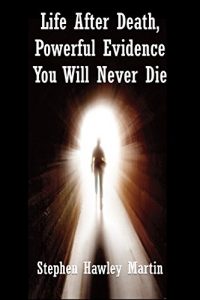What happens when we die? Powerful evidence indicates our consciousness continues. The author spent two years gathering material that demonstrates this, interviewing more than a hundred experts, including medical doctors, psychologists, parapsychologists, psychiatrists, quantum physicists and researchers into the true nature of reality.
The author relates specific examples that indicate what happens when we die, citing among other things examples of memories being formed and retained despite a subject’s brain having shutdown completely. Moreover, he addresses such questions as whether or not we will be able to communicate with living loved ones, whether it is possible to be reborn, and what may be missing from current biological and reproductive theory to explain the various phenomena indicated in the case histories he presents.
Among the notables he interviewed are quantum physicist Henry Stapp, author of “Mind, Matter, and Quantum Theory,” F. Holmes "Skip" Atwater, former President of The Monroe Institute and one-time Training Officer for the once highly classified U.S. Army Intelligence remote-viewing surveillance program, Julie Beischel, Ph.D., Co-Founder and Director of Research at the Windbridge Institute, Stephen E. Braude, Emeritus Professor of Philosophy and Former Chair of the Department at the University of Maryland Baltimore County and current Editor-in-Chief of the “Journal of Scientific Exploration,” and Jim B. Tucker, M.D., medical director of the Child and Family Psychiatry Clinic, and Associate Professor of Psychiatry and Neurobehavioral Sciences at the University of Virginia School of Medicine.
All of us will someday cross the border to what Shakespeare called "The undiscovered country." As long as we have to make the trip, would it not be smart to find out where we are going?
The author relates specific examples that indicate what happens when we die, citing among other things examples of memories being formed and retained despite a subject’s brain having shutdown completely. Moreover, he addresses such questions as whether or not we will be able to communicate with living loved ones, whether it is possible to be reborn, and what may be missing from current biological and reproductive theory to explain the various phenomena indicated in the case histories he presents.
Among the notables he interviewed are quantum physicist Henry Stapp, author of “Mind, Matter, and Quantum Theory,” F. Holmes "Skip" Atwater, former President of The Monroe Institute and one-time Training Officer for the once highly classified U.S. Army Intelligence remote-viewing surveillance program, Julie Beischel, Ph.D., Co-Founder and Director of Research at the Windbridge Institute, Stephen E. Braude, Emeritus Professor of Philosophy and Former Chair of the Department at the University of Maryland Baltimore County and current Editor-in-Chief of the “Journal of Scientific Exploration,” and Jim B. Tucker, M.D., medical director of the Child and Family Psychiatry Clinic, and Associate Professor of Psychiatry and Neurobehavioral Sciences at the University of Virginia School of Medicine.
All of us will someday cross the border to what Shakespeare called "The undiscovered country." As long as we have to make the trip, would it not be smart to find out where we are going?






